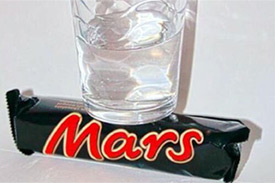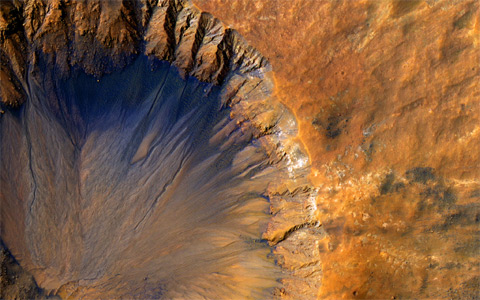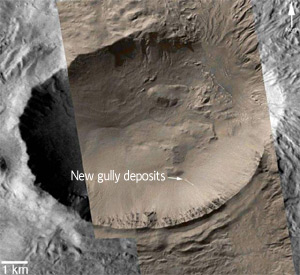From the mainstream media exuberance last week you’d have thought NASA actually discovered ETs on the “Red Planet” ~
 • Liquid water exists on Mars, boosting hopes for life there
• Liquid water exists on Mars, boosting hopes for life there
• Mars Shows Signs of Having Flowing Water, Possible Niches for Life
• Salty Water Flows on Mars Today, Boosting Odds for Life
• Water flows on Mars, raising possibility that planet could support life
Dr Matthew Balme of the Open University was beside himself with unbridled speculation ~
“If we find life on Mars and it can be shown to be of a different origin to that on Earth, then that essentially means that the Universe is teeming with life. It seems almost impossible that life could spring up by chance on two adjacent planets if life was rare.”
Source: BBC
Curb your enthusiasm Matt. As Creation-Evolution Headlines aptly states: Mars Life Would Spit Out the Water.
In response to Dr. Balme’s conjecture ~
(C)an two examples in the same solar system around one star mean the universe is teeming with life? Looks like a bad case of extrapolation. As for life springing up by chance, maybe he needs to think a little about the numbers (see online book).
National Geographic showed admirable restraint ~
Finding evidence for flowing water is not the same as finding life. Right now, scientists don’t know where this water is coming from, or if the chemistry in these Martian seeps is even life-friendly. And unfortunately, chances are it will be a long time before we can get there to find out.

Ultimately, all the hype is Much Ado About Very Little. What NASA actually found was spectral evidence for hydrated salts in recurring slope lineae (RSL). And what exactly are RSL?
They are narrow, dark streaks on some slopes that appear in the Martian spring, intensify in summer, and then fade in autumn. Being very thin, RSL show up only in the highest resolution images of the Martian surface, such as those supplied by the High Resolution Imaging Science Experiment (HiRISE) aboard the Mars Reconnaissance Orbiter (RSO).
While scientists have known about the existence of RSL for several years, the latest data provides indirect evidence for liquid water. Even so, it wouldn’t be the thirst-quenching version of H2O we earthlings are used to ~
The air pressure and temperature are so low on Mars that any liquid water rapidly boils or freezes. However, the presence of certain salts can simultaneously lower the temperature at which water freezes and raise the temperature at which water boils. With an increase in the temperature range at which liquid water can exist even in the very low pressure of the Martian atmosphere, it may be possible for minute amounts of liquid water to exist on the surface of Mars. Hydrated salts incorporate liquid water into their chemical structure.

Evidence of Martian water Dr. Danny Faulkner at Answers in Genesis argues, would seem to point to not only creation – as opposed to evolution – but to a much younger earth than most geologists posit today ~
In many respects, this is not a new story. We have known for decades that water once was abundant on the Martian surface. At one time, there was a northern hemisphere ocean as much as a mile deep. Planetary scientists now agree that there was a global or near-global flood on Mars, where liquid water, if it exists at all, is extremely rare today. Yet these same scientists would scoff at the idea that there once was a global Flood on Earth, a planet awash in water.
Given that liquid water once was abundant on Mars, it should be no surprise that at least a few vestiges of that largess may still exist in cloistered corners of Mars. At least such a thing is possible in a worldview where Mars is only thousands of years old, not billions of years. Planetary scientists generally think that Mars has been dry for two billion years or more. The question is, could significant liquid water have survived since this time?
Hmmmm…




